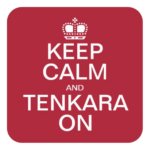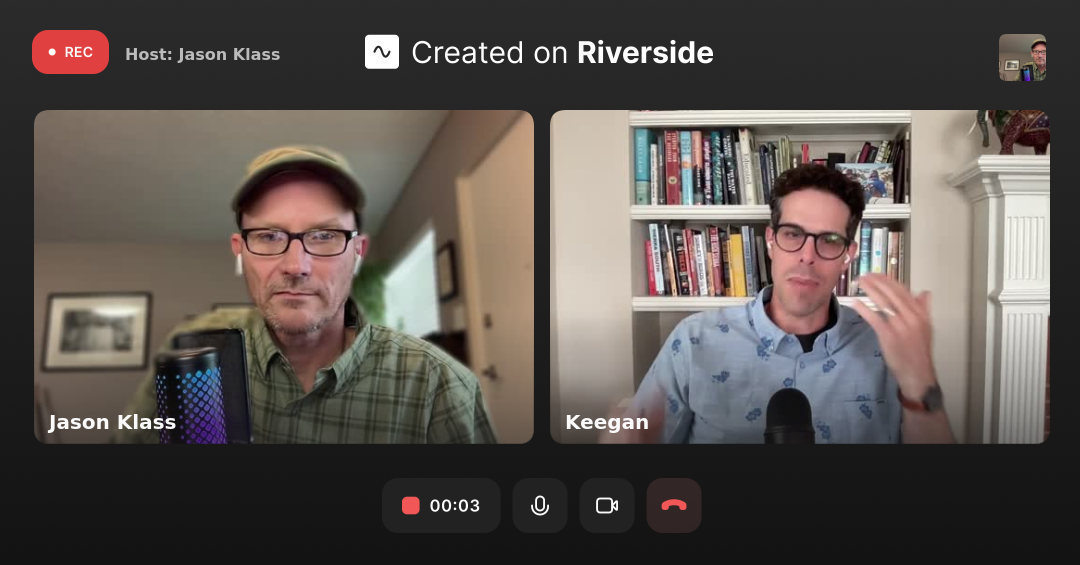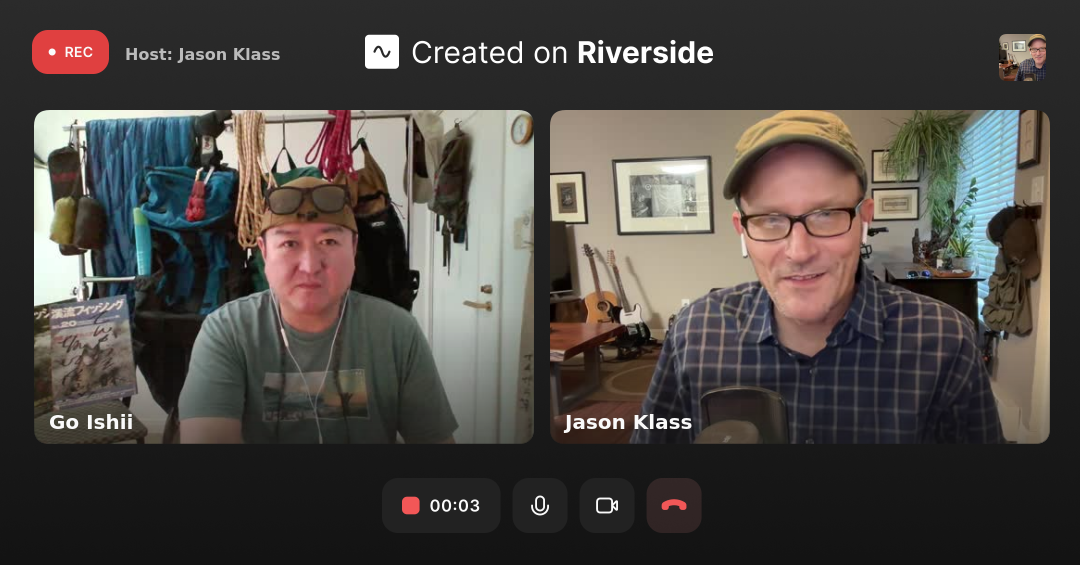Let’s talk tenkara!
 In this ongoing series, Jason Klass hosts casual conversations with tenkara anglers around the world to explore the most interesting and esoteric facets of our rich sport.
In this ongoing series, Jason Klass hosts casual conversations with tenkara anglers around the world to explore the most interesting and esoteric facets of our rich sport.
Have an idea for a topic?
I’d love to hear what you want to hear! Please use the form below to suggest topics for upcoming episodes.
Tenkara Talk Podcast Guidelines
What is this podcast?
First and foremost, please keep in mind that this is NOT a slick, professional, studio-quality podcast The goal is to do this all in one take with no need for editing. Whatever you say, that is exactly what will be in the podcast. There are no “do-overs” or second takes.
This might sound a little intimidating, but relax. Think of it this way … it’s just you and me on a casual phone call talking about tenkara. It’s OK to misspeak, to clarify, to go off on a tangent, to be accidentally redundant. It’s just you and me. No one is eavesdropping (yet), so no pressure!
My goal with these podcasts is to explore a diversity of topics related to tenkara and answer specific questions listeners have. Some of the topics are suggested by listeners so we also want to make sure we adequately cover their questions.
A successful podcast will be one that is intriguing, informative, fun, provocative, and gives the listener something to think about–a practical takeaway.
What you’ll need
- A desktop computer
- Headphones and a mic or ear buds with a mic (I use my iPhone ear buds)
- Skype. If you don’t have it already, download it here.
- A reliable power source for your computer
- A pen and paper to take notes (optional)
- A glass of water (no ice!)
Before we record
The target length of the podcast is about 1 hour, but you will need to block out a solid 2 hours on the day we record so we can test audio and go over a few other details. Plus, I like to make small talk before we begin to warm up the conversation.
- While I’d like the conversation to be mostly spontaneous, I’d encourage you to write down a list of talking points you want to make sure you cover: relevant anecdotes, jokes, examples, technical stats, etc., and weave them into the conversation where you think appropriate.
- Find the quietest room you can with no distractions. Sit in that room for a while and see if you hear any noises that might be picked up by the mic. Can you hear a garage door opening? Construction next door? A buzzing refrigerator?
- In the event that there’s extreme weather that causes noise such as high winds, heavy rain, or thunder, we will reschedule.
- Turn off all appliances that might make a buzzing or humming sound (I always have to turn off my refrigerator because it’s loud). No dishwashers running, fans, Radio, TV, etc..
- If you have pets, please try to find a space where they won’t be able to interrupt you.
- Turn off your phone and/or tablet. Notice I didn’t say “silence your phone”. It needs to be turned off completely.
- Does your wristwatch have an audible alarm set?
- Close all your browser windows so you don’t get any notifications and mute your computer. There should be no sound coming out of your external speakers.
- Find a comfortable chair that is quiet and doesn’t squeak or make any kind of noise when you move.
- Check your clothing. Sit in your chair and move around like you might during the recording and see if anything makes noise. When you reach for your glass, can I hear it?
- Remove any jewelry that might make a sound: necklace rattling, wedding ring clanking on your glass of water, wristwatch hitting the edge of your desk, etc..
- Take 5 right before we start recording to go to the bathroom, fill up your coffee, blow your nose, and take care of any last-minute details that might cause disruption. There are no breaks during recording unless it’s urgent or an emergency or something more important than the fact that you forgot to go to turn the light off in the kitchen.
While we’re recording
As mentioned, there is no editing so please keep the following in mind:
- Do not introduce yourself or talk about your “tenkara origin story”. I will record a separate intro and introduce you so people will already know who you are. This is not your angling biography—it’s a conversation about a specific topic. We’ll assume here that they already know who both of us are.
- Avoid predicting. Don’t say something like, “and later, I’ll talk about … and then I’d like to go over …”. You don’t know that we’ll have time to get to it and if we don’t, it’s a broken promise. Stay in them moment and let the conversation flow naturally.
- If you make a “mistake” or say something erroneous, don’t call attention to it. And absolutely do not say anything like, “can we do that again”, or “can we edit that out?”. Just correct yourself and move on. Just like in any normal real-life conversation, there are no “do-overs”. Treat “mistakes” like Newscasters do: don’t acknowledge them and just move forward as if it never happened. In my experience, listeners don’t even notice or care. So don’t feel tripped up if you misspeak. 99% of people won’t even notice!
- This is a two-way conversation, not a one-way interview. So make sure you allow pauses and places for me to interject. If there’s something you’ve said that I’d like to add to or expand on I’ll cue you in the chat.
- In keeping with the conversational tone we want to set, ask me questions too! If you just gave your answer or opinion on something, turn it back to me where it makes sense. “So Jason, I’m curious what you think about that?”
- Feel free to take tangents if they’re relevant, but always try to tie it back into the main conversation and make sure it’s clear why it was relevant.
- If you’re taking notes, make sure you put the paper somewhere where it won’t rustle and be sure your pen is already clicked on or the cap is already off.
- Avoid fidgeting and gesticulation. If you must make gestures, practice your most habitual ones ahead of time and see if they cause any noise.
- Believe it or not, the hardest thing is to avoid saying “um”. It’s natural to us in daily conversation and is a hard habit to break. But try to say “um” as little as possible, and replace it with other words such as “so”, “therefore”, “and because of that”, “having said that”, “which means”, etc.. I also find it helpful to use contrast words and offer an opposite example or theory: “However”, “on the contrary”, “of course”, etc.. Or, replace “um” with transition words that expound: “for example”, I remember one time”, “that reminds me”, “there was this one time”, “a good example of this is”, etc.. I really struggle with this myself and try to get a little better episode but it’s difficult since it come so naturally. But try to use active transition words rather than the dreaded “um” and remember, it’s not the end of the world if we say it a few times. Even the pros do!
- Do not mention future, time-centric events. For example, don’t mention things like, “I’m giving a clinic April 14th …”. This will be irrelevant to a listener 2 years from now after the event is over. My goal is to produce evergreen content: material that will be just as relevant 20 years from now as it is today. If there is an event you want to promote, I can put it in the description with a link that can be removed after it’s over.
- Watch the time! There’s a timer in the top left corner of your Skype window that will show you how long we’ve been talking. In my experience, late in the podcast the conversation is flowing really well and it’s easy to go on and on. As we get close to an hour, start getting prepared to wind things up and think if there’s anything you want to say before we run out of time. But don’t say something like, “looks like we’re almost out of time …”. I’ll interject when it’s time to cut things off so you’ll know. Again, casual, real-life conversations don’t have an official “time limit” so we don’t want to ruin the tone by calling attention to one for the listeners.
- Like the point above, refrain from “meta talk”. Do not make references to things about the podcast itself such as how long we’ve been talking, asking me if your levels sound good, etc.. In the mind of the listener, this isn’t a podcast–they’re nosily eavesdropping someone’s intriguing conversation.
Your only technical responsibility during the podcast and the most important one, is to use your MUTE button on Skype. Whenever you’re not speaking, you should have your mic on mute and remember to turn it back on right before you speak again (I’ll try to cue you if you forget). We’ll practice this together before we begin.
Chat Cues
In order to communicate with each other, I’ll be using cues in the chat Remember to make sure your chat window is open during the recording and that you’re paying attention to it . Again, make sure you don’t have audible notifications (we’ll test this).
Here are some examples of cues:
>>> = “I’d like to interject.”
??? = “Pause to let me ask a question.”
e.g. = “Please give an example of what you just said.”
5! = “Five minute warning.”
ask me = “ask me the same question I just asked you.”
The idea is to use short cues like these so we’re not distracted by having to read or type full sentences.
The number one most important thing:
Be yourself! Give personal anecdotes, make jokes, disagree with me, be sarcastic, laugh, swear, be irreverent, raise your voice if something we’re talking about irritates you. Don’t hold back and feel you need to to censor yourself. It’s just you and me, so have fun! If you and I enjoy the conversation, so will our listeners!
Lets’s talk tenkara!
If you have any questions, contact me:
Jason Klass
(303) 803-2740
jason@tenkaratalk.com
Skype: jasonklass
Search Tenkara Talk
©2023 | Tenkara Talk by Jason Klass | All rights reserved





